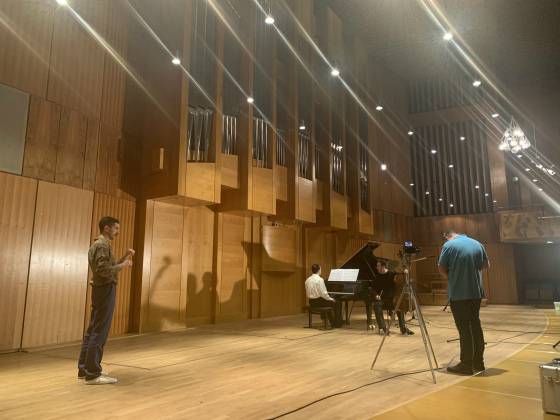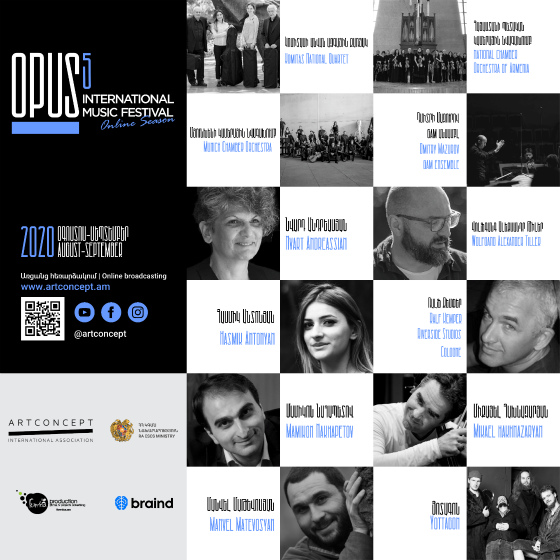Art is more accessible. The 5th concert season of the "Opus" festival has begun

The International Festival "Opus", organized with the support of the International Association "Artconcept", Ministry of Education, Science, Culture and Sports of the Republic of Armenia, has united the music-loving audience for the fifth time since August 10. On this occasion we spoke with the art-director, the composer Arsen Babajanyan, and learned more details.
The Opus International Festival will unite the art lovers for the fifth time already, and the passed road map is quite large. Let's talk about the highlights and successes of the past path.
You are right. The Opus Festival kicked off in 2014. The first two concerts took place in Moscow, then in Yerevan and Paris. The festival has an itinerant nature, which is one of the key features of the festival. Considering the current pandemic situation, we decided to take the festival in online format.
Being a music festival by its nature, we try to supplement it every year with programs related to other fields of art. The idea is to create a communication bridge between different artists, as well as to unite audiences with different genre preferences in one space. We have had quite successful results so far and we will continue to work in this direction.
Live performances and communication have been replaced by remote contact because of the current situation. Let's talk about the technical processes. How will they be implemented? What new solutions will you offer to this festival?

As the festival is being held online for the first time, of course, all the solutions are new. From the beginning, we have developed a certain concept around which the program of the festival is built. Indeed, most people switched to online format this year, but we've tried to find a small alternative to the live concert format. The concert videos are made in a way that the audience is closer to the event temper, to the core idea and to the musicians.
Attending live concerts is not just about listening, visiting a concert hall already presupposes a cultural ritual. However, these feelings are not easy to convey to the audience when they are just sitting in front of their TV or computer and watching the performance.
Almost all the seasons of the Opus festival have different subjects - a central theme. We would like to keep this principle in the online format as well. Therefore, almost all of our broadcasts are spiced up with videos that raise a variety of topics, trying to create an interactive connection with the audience. For instance, the festival commissioned a special work to sculptor Manvel Matevosyan and aimed not only to present his work in a best way to the audience, but also to give the audience a unique chance to be better acknowledged with one of Armenian progressive sculptors. One of the guests of Opus 5 festival is the Austrian artist Wolfgang Alexander Tille. The peculiarity of his style is that he creates his works inspired by the specific landscapes, using the environment. Being free to choose the area, this time he created a new video installation. The video was captured in a private house in Rösrath, Germany, which no longer exists today! The author of this house is a German architect Schneider-Wessling, who is especially known for his outstanding, alternative approaches to build houses, trying to open the barriers between the house and the surrounding nature as much as possible.
Knowing that the house will be demolished soon, he shoots a video performance there, trying to have a peaceful farewell with the walls waiting for the destruction.
Basically, the sculpture seems to be the light motif of the Opus 5 festival. We have made a special film about the works created by sculptor Benik Petrosyan at the Composers Resort in Dilijan, which, however, are not widely known to the public. In the film his children - famous artists Arev and Areg Petrosyan, are telling about his works and Benik Petrosyan's character in general.
The events are so diverse that it is very difficult to present everything in one interview.
When talking about online processes, we can not ignore the question of advantages and disadvantages of this format. What are the pros and cons of the pandemic side effects within the framework of this festival?
As I have already mentioned, attending live events is a ritual itself, which cannot be transmitted remotely. In the concert hall, exhibition hall, theater, cinema, the connection between the artist and audience is regulated in a different way. But the online platform also has its advantages. In particular, the boundaries are removed. The events are available not only to the audience of a specified area, but, saying it generally, worldwide. Furthermore, some artists, who could not be in the same place in scope of the same festival for technical reasons, can now participate from their current location. As part of Opus 5, we will have videos from Yerevan, Dilijan, Moscow, Rösrath, Cologne and Munich.

The Opus International Festival is more inclined to an interdisciplinary approach. The latter is not only aimed at presenting the performing arts and the composer art, but also often includes interesting series of lectures and seminars. What topics are included this year, who are the speakers during this festival?
Yes, exactly. In the scope of previous seasons of the festival, we have had seminars, lectures, discussions, meetings, etc ... This year is no exception. This time, conductor Nvard Andreasyan will have a lecture, during which along with pianist Hasmik Antonyan they will analyze the 9th Klavierstuck of Karlheinz Stockhausen, one of the most outstanding and innovative composers of the 20th century. Under this light, the festival also includes educational elements, which is very important. The works of art often need an interpretation. The people who don’t have a professional background but are interested in the arts should have access to the passwords to unveil the art works. This is especially important for modern art. We try to create such an opportunity during our festivals. I should admit that the results are quite encouraging.
As part of the current festival program, we also have an interview with Ralf Kemper – composer, producer, sound engineer and CEO of Riverside Studios Cologne, one of the renowned recording studios of Germany. Ralf Kemper has a very rich background of international cooperations. He has worked with such musicians as Quincy Jones, Peter Erskine, Adam Lane, Bob Mintzer, Tigran Hamasyan and others. Furthermore, he won a 13th Latin Grammy Prize for his collaboration on the album “A time for love” by Arturo Sandoval. For many years he worked at the world-famous studio Abbey Road. During the interview, he tells some details about aforementioned collaborations, about the art of recording, the peculiarities of the digital and analog audio techniques, as well as about the concert activities of Riverside Studios Cologne.
What criteria were the basis for the concert programs? Who are the performers?
This year we are honored to host the Munich Chamber Orchestra at our festival. Their participation in our festival is significant not only because it is one of the best orchestras in the world, but also because Ludwig van Beethoven's third symphony "Heroic" will be performed in the program. As we know, this year the world celebrates the 250th anniversary of the great composer. The Beethoven theme continues with the red line also in other events in scope of the festival. In particular, the concert of the Komitas National Quartet includes the performance of Beethoven's Opus 95 String Quartet.
During the broadcast a short film touches upon the history of the Beethoven Concert Hall located in the Dilijan Composers House.
The works of the artists Manvel Matevosyan and Wolfgang Alexander Tyler are also related to Beethoven. The video installation of the latter is called "To the memory of an angel". This work is related to Beethoven's anniversary, as it was created in collaboration with the Beethoven Symphony Orchestra in Bonn. An extended version of the installation is created especially for our festival. The work is inspired by Alban Berg’s homonymous Violin Concerto.
And the sculpture created by Manvel Matevosyan, is a thought about the secret of music creation, impressed by Beethoven's works. How to create a cosmic world with few and simple means - only notes. This deepens the synergies between music and fine arts.
We are pleased that the State Chamber Orchestra of Armenia will perform the Mendelssohn Octet within the framework of the festival. In regard to chamber music, we have a broadcast from Munich, where wonderful musicians, cellist Mikael Hakhnazaryan from Berlin and pianist Mamikon Nahapetov from Munich perform.
The program includes works of Debussy, Schumann and Bach. Along with the concert, the musicians will talk about the works performed in a short video.
Among our foreign guests are composer Dmitry Mazurov and the GAM ensemble of contemporary music, who will present Mazurov's works, including world premiere, which include instrumental, electronic music, as well as video art.
One of the features of Opus 5 festival is that the festival will be closed with jazz music in "Jazz weekend" format. The band Yottagon from Cologne will have the presentation of their new album „Tristopia” within the framework of our festival. Also, the concert of Grégory Privat Trio will be broadcasted, in addition to the aforementioned interview with Ralf Kemper. The concert of this jazz trio is recorded in Riverside Studios Cologne in the frame of special concert series B.o.B. (Berühren ohne Berührung, which means touch without touch) and will be broadcasted with kind permission of Riverside Studios specially for OPUS 5 festival.

Let’s have a smooth transition to the audience. What is the demand today's audience puts for the musician? Is it the same demand in Armenia, outside Armenia?
It is quite difficult to make such general assessments in regard to differences between the audiences of different places. Even within the same city the audience can vary from event to event. The demands of the audience depend on several circumstances of public life, they have two phases. At the initial stage, the quality of demands of the society can be quite low, people go for easy, accessible and straightforward material, it's logical. Hence the widespread use of distasteful and low-quality trash in the pop music world.
It's a matter of education which should be under the attention of both - governments and individuals. People must learn from an early age to get in touch with high-quality, professional art, to get acquainted, to let their souls get closer to that world. This will create a society that is interested in real art. In the language of today's capitalist world, a market will be created that is ready to "consume" art. And when there is a large number of consumers of high-quality art, the second stage comes when they, as "consumers", will demand new, high-quality, valuable art from artists. This is how healthy competition is created - all artists, ensembles, organizations will crave to improve, to present a material of better quality.
Indeed, a variety of new technical tricks are emerging nowadays, making it easier to deliver art material. But in general, as a rule, the true values of art pave their way to people throughout history; masterpieces of art are still reachable to our souls. And it is wonderful.
Interview by Meri Hovhannisyan
- Created on .
- Hits: 1552